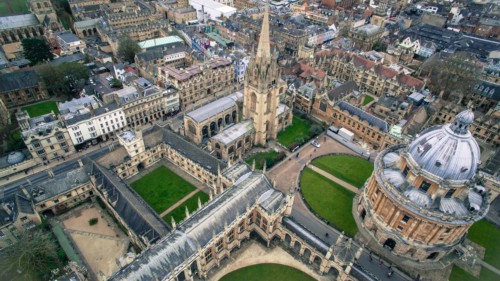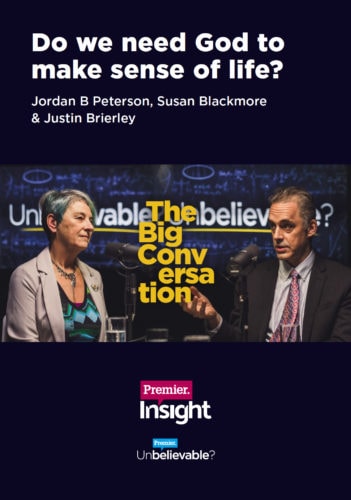
Finding God at Oxford: Carolyn Weber’s Story
Posted:Jana Harmon, host of the SIDE B Podcast with a PhD research in adult conversion, tells the story of how Carolyn Weber came to Christian faith.
A Life of the Mind
“My father was really troubled and was in and out of my life. He was gone quite a bit.
And when he did show up he was very difficult or violent or despondent or what not.
So by extension, I wasn’t going to trust a father, and certainly not an eternal father.” (Carolyn weber)
A voracious reader, Carolyn’s high level of education in literature spilled out through her winsome and colorful language. Contemplative by nature, she had a keen grasp of ideas, of worldviews, and of her own perspectives and life story. Growing up “loosely Catholic,” Carolyn attended church with her grandparents a few times as a young child although God was not any part of her own home. Her Canadian community was mixture of affluent, educated professionals surrounded by rural agriculture and Mennonites. They were “good people, comfortable enough to not really need God.” Struggling to survive on her own, she counted herself among them:
Although I felt loved by my parents, my father was really troubled and was in and out of my life. He was gone quite a bit. And when he did show up he was very difficult or violent or despondent. By extension, I wasn’t going to trust a father, and certainly not an eternal father. And, my mom was quite bitter, particularly about God…I was basically surviving. I was working several jobs and supporting my family. My dad was in and out of my life. My mom was a single mom raising us and was drinking at night. I was working. I was so busy surviving.
By the time she reached high school, Carolyn decided she was an agnostic because she knew intellectually it was difficult to completely rule out God’s existence. Although she couldn’t dismiss it entirely, religion became “stereotypically ridiculous” to her. After all, she had been exposed to negative messaging from family, friends, culture and education about religion. She also lacked exposure to true, embodied Christianity. Belief was implausible and unattractive and she wanted nothing to do with it. She recalled,
I really didn’t have any Christian friends. I only knew a handful of people in high school who were Christians and they seemed quirky and hypocritical. My brother’s concept of Christianity was a TV evangelist taking your money and that’s what I thought it to be. I went through 20 years of public education and was never required to read the Bible which I find shocking in and of itself. No one even gave me the option of reading it and to think about the Bible as a viable option to even give me the dignity of turning it down. No one had even said to me on a very straight basis, ‘Do you know who Jesus is?’ ‘Have you given it any thought?’ There is that kind of tick that the name of Jesus has. If you don’t have somebody who is in your family or who is a friend or crosses your path, what other cultural message are there? They are not that plentiful.
When Carolyn left home to attend Oxford on scholarship, she also set aside her busy self-sufficient life and found a slower contemplative rhythm. University life allowed her opportunity to meet new people and encounter new, challenging perspectives, and gave her space to reconsider life’s biggest questions. It opened her towards something unexpected. In asking her what began to change, she responded,
It was a combination of both head and heart. One of the things that cracked me open was when I finally got to university and had the time to read because I wasn’t allowed to hold a job and I had scholarship money. And I had this culture of contemplation. I actually read the Bible for myself. I began talking to other Christians. I was also researching world religions for my thesis, but there had always been a longing in me that I knew was there but now I was able to sit with it. I had thinking Christians who were able to some degree were able to answer my questions but who were also respectful, who treated me with dignity, who asked me questions.
Another thing that open the door for me was when someone asked me, ‘Who is Jesus to you?’ I had never thought of that question, that we could go through life and not only not be aware of God but even possibly mock God or be in a society that does. So there is an academic part of me that thought, “I can’t answer that. Maybe I should look into this. It is one of the largest questions that there are in life.”
The Divine Mind
Carolyn began to consider Christianity more seriously but “kicked against it” at the same time. Suspicious by nature, she explained how she found it equally intriguing and threatening.
When I became intrigued by Christianity and started to look into it more seriously, I kicked against it a lot too. I was more suspicious by nature, which I think is the case quite often when the rug has been pulled right from under you, especially as a child. I probably hadn’t thought through completely the implications of being an atheist or agnostic, but I did so more as I was beginning to realize that Christianity had something to it because a line is drawn in the sand. The bottom line is, Do you believe who Jesus said he was? He made some pretty crazy claims, so do you believe them or not? If you believe them it changes everything. And that is a strong line to step over.
Carolyn began to investigate the claims of Jesus and Christianity while also reading the bible. Her presumptions about the ridiculous nature of belief began to melt as she became acquainted with the historical writings, the biblical texts, as well as the generous, ‘normal’ lives of intelligent Christians. When asked Carolyn what opened her towards reconsidering the possibility of the Christian claims as being true, she responded,
For one, reading the bible and thinking about it and having it work on my heart. When I read Genesis for the first time I thought, “This makes a lot of sense. There is something wrong with our world. There is something in me that craves something better. Where does that craving come from?” So there was a practical level to the Bible but it was also something that I could never have made it up in a million years. Like Dorothy Sayers says, “It is so bizarre as to be true.” And, reading it felt true.
I also began to realize that there is a great, tremendous intellectual history to Christianity, that these people aren’t crazy. Bonhoeffer and church fathers are intelligent people who have their heads on and they actually believe this. In realizing this I mourned, ‘Nobody ever told me this.’ There was also this grief that these dots had not been connected for me or at least been given to me in an unbiased way.
As I began to meet more Christians and realizing their intellectual rigor, I also saw how other Christians acted and treated people. The Christians I met who really walked their talk. At first, that irked me because I didn’t really think that they could be for real, so I was trying to poke them apart. In many ways they were living out the Gospel. I just didn’t know what that was yet. It wasn’t like they were these cheesy people either or unbelievably good. They were funny and down to earth and made mistakes, too, but I saw this difference. Christians would have me to their home for dinner or open their place for me to be restored. There was a gentleness and servitude and this intuitiveness and there were also many ways in which they engaged me.
With All Your Heart, Soul, Strength… and Mind
Along with seeing Christians and Christianity anew, Carolyn began to recognize devastating contradictions and meaninglessness within atheism which she couldn’t reconcile.
I began to then realize that the option of atheism held nothing. It was meaningless. At least it wasn’t a fair game. It wasn’t fair play…You [atheists] want me to have what you have and I don’t want it. Really, what is your answer to me instead of this, that there’s no meaning and everything is meaningless and there’s actually no absolute truth and that itself is an absolute truth that you are trying to put forward. All of that began to disintegrate. It just didn’t hold any water.
Carolyn’s tipping point towards God came through a process of reading stories of other intellectuals who also made the journey from atheism to Christianity, helping her see its embodied viability. Reading the bible, she found nowhere to hide from what she was realizing was the truth. Finally, she reached a moment when she ‘believed that she needed to believe’ and welcomed the grace that awaited her.
I remember reading A Severe Mercy by Sheldon Vanauken and being moved. I was really wrangling with it. I identified with his suspicion. You get to the end of the intellectual sidewalk and it has to be a heart issue. But he defines it not so much as a leap forward as turning around and realizing that if you didn’t accept Christ, the chasm behind him…So there was nowhere to hide. And that was the tipping point. You begin to think, “I either have to look this in the eye and answer God in my heart or I can just turn away and trying to ignore it.”
In our culture we have a tendency to impart shame if we think we can’t fix everything or if we need a placebo like God. But looking at the life Jesus promises in Him and that there are no other religions that operated by grace. There was actually tremendous freedom in that and a great relief that I didn’t have to fix it all or do it all or be it all which was the first thing I kicked against because at first grace seemed so appalling because I couldn’t achieve it or do it or control it. But, thank God, actually. He does that for all of us.
Against what she once thought possible, Carolyn was able to trust a heavenly father. Once unknown, she was able to embrace Jesus as the one who is full of truth and grace.
If you’d like to listen to Dr. Carolyn Weber tell her story, tune into the SIDE B Podcast with Jana Harmon, Ep. 4 dated 11 December, 2020: “Finding God at Oxford – Carolyn Weber’s Story”
Jana Harmon hosts the Side B Stories podcast where former atheists talk about their turn from disbelief to belief in God and Christianity. She is a Teaching Fellow for the C.S. Lewis Institute of Atlanta and former adjunct professor in Cultural Apologetics at Biola University where she received an M.A. in Christian Apologetics. Jana also holds a Ph.D. in Religion and Theology from the University of Birmingham in England. Her research focused on religious conversion of atheists to Christianity.
Want to learn more? Download your free, exclusive ebook: “Do we need God to make sense of Life” (featuring Jordan Peterson)
